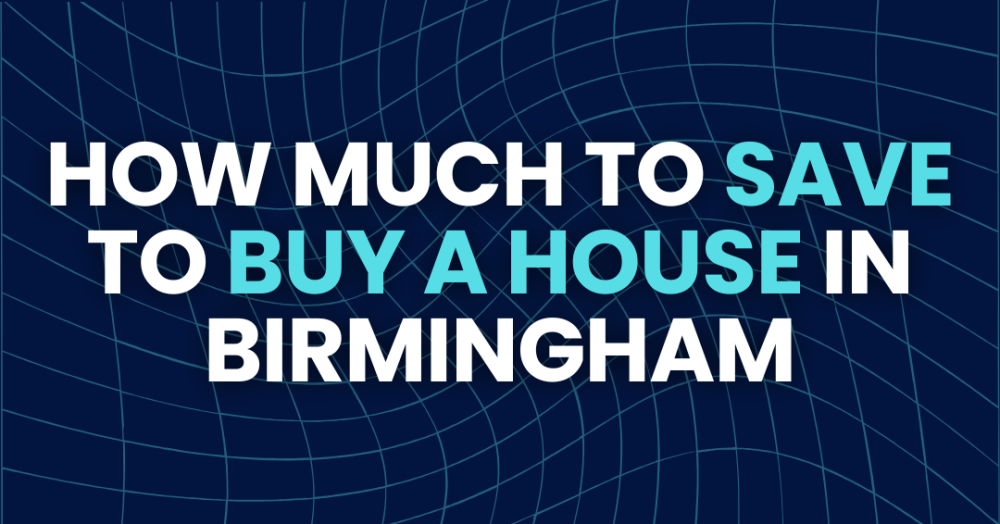Buying a house is one of the most significant financial milestones for many people. It's essential to understand the costs involved and determine how much you need to save. Here's a breakdown of what you should consider when preparing to buy a home in Birmingham.
1. The Cost of Houses in Birmingham
The average property price in Birmingham varies based on location, property type, and market conditions. As of 2024, the average property price in Birmingham is approximately £250,000, but this can range significantly:
- Detached houses: Around £400,000 or more
- Semi-detached houses: Approximately £260,000
- Terraced houses: About £210,000
- Flats: Around £150,000
Research your desired neighbourhoods in Birmingham as prices vary between areas like Edgbaston, Harborne, and Selly Oak.
2. The Deposit
A deposit is a percentage of the property price that you pay upfront. In the UK, lenders typically require a deposit of at least 5%–20% of the property value.
For a £250,000 property:
- 5% deposit: £12,500
- 10% deposit: £25,000
- 20% deposit: £50,000
Saving a larger deposit often allows you to secure better mortgage rates, as it reduces the lender's risk.
3. Additional Costs to Consider
In addition to the deposit, there are other costs associated with buying a house:
Stamp Duty Land Tax (SDLT)
In England, properties priced below £250,000 are exempt from Stamp Duty for first-time buyers. For properties over £250,000, the rate starts at 5% on the amount above that threshold.
For example, if you buy a house for £300,000:
- The first £250,000 is tax-free.
- The remaining £50,000 is taxed at 5%, which equals £2,500.
Legal Fees
You'll need to pay for a solicitor or conveyancer to handle the legal aspects of the purchase. This typically costs £800–£1,500.
Survey and Valuation Fees
Survey costs range from £300 to £1,500, depending on the type and thoroughness of the survey.
Mortgage Fees
Lenders often charge arrangement fees, typically between £500 and £1,000. Some mortgages may include free valuations or cashback options, so shop around.
Moving Costs
These can include hiring movers, which usually costs around £500–£1,000, depending on the size of your move.
Home Insurance
This is mandatory for homeowners and costs approximately £150–£300 annually.
4. Emergency Savings
It’s advisable to maintain an emergency fund equivalent to 3–6 months’ living expenses even after buying a house. This ensures you're prepared for unexpected expenses, such as repairs or job loss.
5. Total Savings Estimate
To summarise, if you're buying a house in Birmingham for £250,000, here’s a rough estimate of what you should save:
- Deposit (10%): £25,000
- Stamp Duty: £0 (first-time buyer, under £250,000)
- Legal Fees: £1,000
- Survey Fees: £500
- Mortgage Fees: £1,000
- Moving Costs: £1,000
- Insurance and Miscellaneous: £300
Total: Approximately £28,800 (plus an emergency fund).
6. Tips for Saving Up
- Set a Budget: Track your income and expenses to identify areas to cut back.
- Open a Lifetime ISA (LISA): Save up to £4,000 annually and receive a 25% government bonus (£1,000 max per year) toward your first home.
- Reduce Unnecessary Spending: Limit luxury expenses and find cost-effective alternatives.
- Consider the Help to Buy Scheme: Check if you’re eligible for government schemes like shared ownership or equity loans.
Conclusion
Saving up for a house in Birmingham requires careful planning and discipline. Start by researching property prices in your preferred areas, and account for both upfront and ongoing costs. By setting realistic goals and leveraging government schemes, you can achieve homeownership in one of the UK’s most dynamic cities.
Finally saved enough for a deposit? Let us help you find you your dream house!
Call us on: 0121 681 6327
